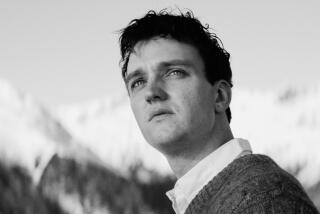‘North Face’
- Share via
It is almost impossible not to be caught up in the spell of “North Face.” As riveting and exhilirating as it is heartbreaking, the film is loosely based on the 1936 attempt by two mountain-climbing teams to be the first to summit the Swiss massif dubbed Eiger, the ogre.
German writer-director Philipp Stölzl has managed to so blur the line between reality and fiction that if you let yourself it can feel as if you’re clinging to the frozen side of “Murder Wall” alongside them, with a 2,000-foot death drop just one misstep away.
This is a film done right by just about every measure. The extremes of the story seep deep into your bones -- the beauty, the allure, the desperation and especially the cold in this world where life literally hangs on rope and what Mother Nature chooses to throw at you. But this is far more than man versus mountain; Stölzl captures the growing Nazi menace that played a significant role in this real-life drama as deftly as the singular obsession of two country boys determined to reach Eiger’s peak and, they hope, immortality.
Those themes provide the narrative drive for the film. We meet Toni Kurz (Benno Fürmann) and Andi Hinterstoisser (Florian Lukas) in their rural village, reluctant foot soldiers in what will become Hitler’s army, cleaning latrines after coming back late from a climb. Meanwhile at a Berlin newspaper, now part of the Third Reich’s propaganda machine, editors are discussing their role in resolving what is chillingly referred to as “the Alpine problem.” Nazi command has determined that a German team must summit Eiger first so they can be put on display at the coming Olympic Games in Berlin. The problem: No German climbers have stepped up, while teams from other European countries are setting up base camps.
As Andi and Toni debate whether to make an attempt, Luise (Johanna Wokalek), who climbed with them as a child, is now a flunky at the paper. She’s eager to make a career for herself, so she’s easily used and becomes the bridge between the story arcs. Soon enough, the guys have quit the army to take on Eiger and she’s tagging along with her boss, Nazi sympathizer Arau (Ulrich Tukur), to take photos of the attempt.
And then suddenly we are there, moving between Toni and Andi’s rain-soaked tent and the opulent hotel where the media swarm and the rich, who’ve come to be entertained by the spectacle, gather.
Stölzl, whose background is an eclectic mix that includes staging operas as well as directing commercials and music videos, creates these contrasting worlds without it ever seeming forced or operatic. Great attention has been paid to getting the details right: the woefully inadequate jackets, lederhosen and wool socks the climbers of that era wore, the hand-forged pitons.
There is much that Luise will learn about life, love and the dark implications of Hitler’s influence as “North Face” unfolds, but it is on the mountain with Toni and Andi where the movie soars. With much of “North Face” shot on location at Eiger, and cinematographer Kolja Brandt often using hand-held cameras to capture real climbers doing the dangerous work on the mountainside, the film has a documentary-like authenticity and immediacy about it that only heightens the sense of jeopardy.
There is an authenticity that saturates the performances as well, with eagerness and innocence, then understanding moving like storm clouds across Wokalek’s face, while Fuermann’s Toni, in particular, finds the essence of his reluctant hero.
As Toni and Andi make their way across ice fields, through blizzards, dodging rock slides, pressing always for the peak, you can feel the cold move in, frostbite turning fingers black, ice crusting on faces. Disasters of all sorts do come, and their humanity as much as their skill is tested.
As for the metaphors to be found on that treacherous climb, like Toni, Andi, Luise and the rest, we are left to discover those for ourselves.
More to Read
Only good movies
Get the Indie Focus newsletter, Mark Olsen's weekly guide to the world of cinema.
You may occasionally receive promotional content from the Los Angeles Times.








